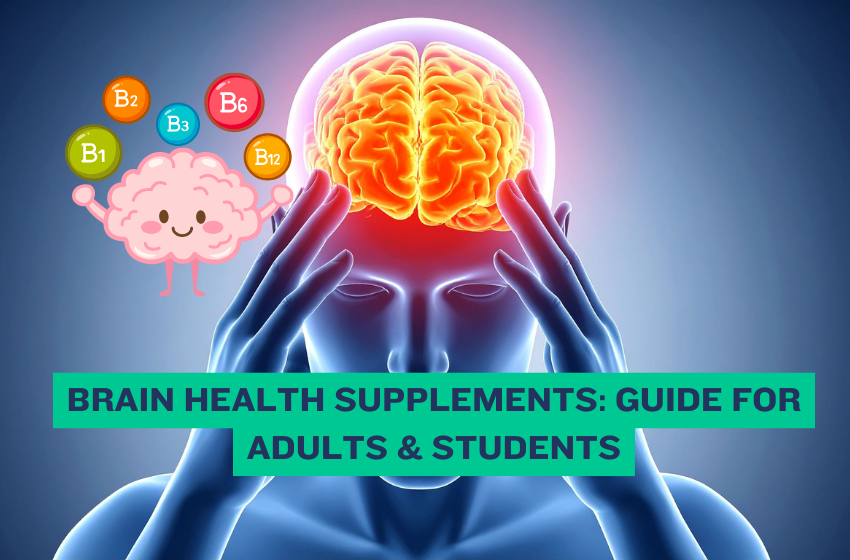
Brain Health Supplements: Guide for Adults & Students
Brain health supplements are important if you want to boost your mental clarity, memory, and focus. They can help both young people and adults stay sharp.
This article explains what brain health supplements are and how they work when used wisely. It also highlights what to avoid when choosing them. You’ll learn about brain health supplements in Pakistan, the best brain supplements for adults, and brain vitamins for studying.
We’ll also cover the best vitamins for brain fog and memory, best vitamins for brain health, and the main benefits and side effects. By the end, you’ll have a clear, simple understanding to help you make smart choices.
What Are Brain Health Supplements and Why People Use Them?
When we say brain health supplements we refer to vitamins, minerals, herbal extracts or combinations thereof that claim to support cognitive functions such as memory, focus, learning and mental clarity. Many people turn to them when they face brain fog, memory lapses, or heavy studying demands (brain vitamins for studying). Others look for best vitamins for brain health as they age or manage work stress.
In Pakistan the interest is increasing: “brain health supplements in Pakistan” is a growing search term as more people look for local availability and affordable options. The attraction is clear: you want something extra beyond food and sleep. For instance, some studies suggest that taking a daily multivitamin-mineral supplement over several years slowed cognitive aging by about two years compared with placebo.
Read Also: What Are 5 Signs Your Brain Is in Trouble
However, it’s important to understand that the evidence is mixed. According to Harvard Health Publishing you should not rely on supplements as a guarantee of improving brain function. Thus brain health supplements may help under certain conditions, but they are not magic. The key lies in understanding benefits and side-effects and choosing wisely.
Benefits of Brain Health Supplements
When used properly, brain health supplements can offer several benefits. Here are some of the major ones:
- They may provide nutrient support when your diet is lacking. For example, minerals such as magnesium help nerve signalling, muscle and brain cell function.
- They might aid memory and executive function, especially in populations under stress or aging. One study found that a daily multivitamin-mineral slowed cognitive aging by the equivalent of about two years compared with placebo.
- For students or busy professionals looking for brain vitamins for studying, certain supplements can help with focus and mental clarity, especially if there is a sleep, diet or deficiency issue.
- For those experiencing brain fog or memory issues (best vitamins for brain fog and memory), supplements might fill gaps while you improve lifestyle (sleep, diet, exercise).
- In countries like Pakistan where nutritional gaps may exist, brain health supplements in Pakistan could help when diet alone is insufficient (though quality and safety matter greatly).
In practice, benefits depend on what you already eat, your lifestyle, your age, and whether there is a deficiency. Supplements alone won’t override poor sleep, chronic stress or bad diet.
Side-Effects and Risks of Brain Health Supplements
Using brain health supplements brings risks and side-effects as well. Here are things to watch:
- Many supplements are not well regulated. The Food and Drug Administration (FDA) does not always verify claims made about brain supplements. According to the Global Council on Brain Health, there is no firm proof that dietary supplements prevent cognitive decline or dementia.
- Some side-effects may include stomach upset, headache, nausea, allergic reaction, or interactions with medications.
- For example, herbal supplements like Ginkgo biloba may cause dizziness, heart palpitations, bleeding risk.
- Over-dosing vitamins or minerals may cause harm. Also mixing certain vitamins with minerals (for example magnesium with other nutrients) can interfere.
- A study on self-reported brain health supplements found that many users reported itch, rash, wheezing, chest pain as negatives.
Best Vitamins for Brain Health
When you are an adult looking for best brain supplements for adults and best vitamins for brain health, you must consider several factors.
First: Do you have a deficiency? For example, low levels of magnesium can affect brain and nerve function. Signs include fatigue, muscle spasms, abnormal heart rhythms.
Second: Are you using the supplement as support, not substitute for healthy lifestyle? Evidence shows that diet, exercise and mental challenge remain the most important for preserving cognitive health.
Third: Choose research-backed nutrients, such as:
- Magnesium: supports nerve signalling, synaptic plasticity.
- Phosphatidylserine: a component of brain cell membranes, may help memory.
- Multivitamin-mineral combos: may slow cognitive aging modestly.
Fourth: Pay attention to dose, brand, purity. Because brain health supplements in Pakistan may face regulatory variability, check whether the product is independently tested, non-expired, and from a trusted brand.
Fifth: Monitor side-effects and interactions. If you take prescription medication, always consult a healthcare professional before adding supplements. Side-effects or interactions may occur.
Adults seeking best vitamins for brain health should aim for solid diet first, then targeted supplements when needed, not relying solely on them.
If you’re thinking of using brain health supplements, check your baseline nutrition, consult a healthcare provider, verify the brand, and understand that more is not always better.
Vitamins for Brain Memory for Students
If you are studying, memorizing, or working under mental pressure, the concept of brain vitamins for studying and best vitamins for brain fog and memory becomes relevant.
Read Also: Brain Health Foods: Top Nourishing Picks for Better Thinking
Young adults may benefit from focusing on nutrients that support concentration, energy metabolism, and memory formation. For example:
- Omega-3 fatty acids (though evidence is mixed) are often cited for brain function support.
- Magnesium helps nerve signalling, brain cell health, and may support memory under deficient conditions.
- Ensuring B vitamins (e.g., folate, B12) are sufficient because they support brain and nerve function.
However, it’s vital to note that major studies do not firmly support the claim that taking brain health supplements will dramatically boost studying performance if you are already well-nourished. According to one review: high-quality trials do not support dietary supplements for prevention of cognitive decline or treatment of dementia
Final Thoughts
Brain health supplements can play a supporting role when used thoughtfully. We have seen the topic of brain health supplements, how people in Pakistan and globally look for best brain supplements for adults, brain vitamins for studying, best vitamins for brain fog and memory, and best vitamins for brain health. We’ve reviewed their benefits and side-effects. We examined magnesium in detail because of its strong role in memory, focus and brain cell function.
Important reminder: Brain health supplements are not a substitute for a healthy lifestyle. Prioritise sleep, nutritious whole foods, mental exercise, physical activity and stress management before turning to supplements. Always check with a healthcare provider, especially if you take medications or have health conditions.
When used wisely, brain health supplements may support your goals—but they work best alongside a solid foundation of good habits. If you are in Pakistan or elsewhere, check quality, reliability and suitability for your individual needs.
FAQs
You can train your brain by engaging in challenging mental tasks (learning a new language, solving puzzles), staying socially active, getting adequate sleep, exercising regularly, and maintaining a healthy diet. These habits build brain resilience more reliably than relying solely on supplements.
There is no single “best tablet” for brain health. The effectiveness depends on your individual nutrient status, deficiencies, diet and lifestyle. Always consult a doctor before choosing supplements.
Three key foods often called “brain superfoods” are: fatty fish rich in omega-3s (e.g., salmon), dark leafy greens (rich in folate and magnesium), and berries (high in antioxidants). These support brain health via nutrients, antioxidants and reduced inflammation.
When you take magnesium daily (in appropriate dose), you may experience improved nerve and muscle function, better energy, reduced muscle cramps, and possibly improved focus if you were deficient. But taking too much or without need may cause digestion issues or electrolyte imbalance.
Signs include fatigue, weakness, low appetite, nausea, muscle spasms or tremors, numbness or tingling in limbs, leg cramps and abnormal heart rhythms
The heart is one of the organs most affected by magnesium because low magnesium can disrupt electrical signals and cause abnormal rhythms. The brain and nervous system also heavily rely on magnesium.
Magnesium can interfere with absorption of some minerals (like calcium, iron) if taken at the same time and may interact with certain medications. It’s best to space doses and consult a healthcare provider. Also, combining many supplements without guidance may increase risk of side-effects.









